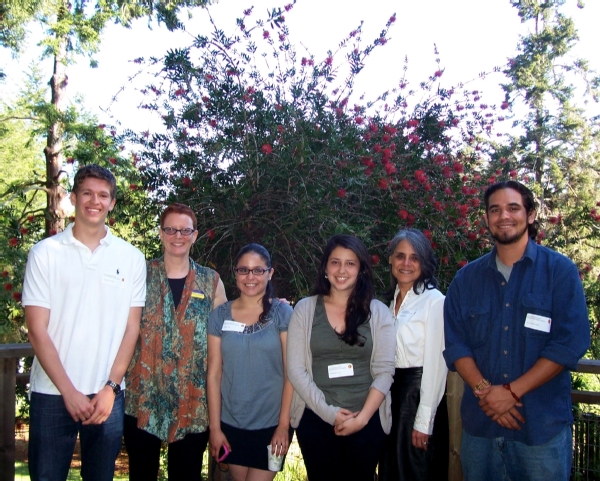2012-2013 Mentorship Participants
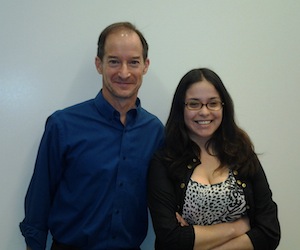 Jannet Ceja is from Salinas, California and is graduating in June with a B.A. in Politics. She is a transfer student from Hartnell College, and she works as a peer adviser for STARS at Kresge. When she is not working out in the community as a caregiver, she enjoys hiking and reading. Her interests include U.S. politics, especially public policy and political history. Following graduation, she would like to try and work for a local organization or attempt to get herself involved with the state or county government.
Jannet Ceja is from Salinas, California and is graduating in June with a B.A. in Politics. She is a transfer student from Hartnell College, and she works as a peer adviser for STARS at Kresge. When she is not working out in the community as a caregiver, she enjoys hiking and reading. Her interests include U.S. politics, especially public policy and political history. Following graduation, she would like to try and work for a local organization or attempt to get herself involved with the state or county government.
Daniel Wirls is professor of Politics. He has been at UCSC since 1988 and served as chair of the department from 2005-2010. He has published three books, including his most recent, "Irrational Security: The Politics of Defense from Reagan to Obama" (Johns Hopkins University Press, 2010), as well as articles and chapters on a wide variety of aspects of American government and political history.
Summary of Project
"Debating the Filibuster: An Analysis of Senate Deliberation on Cloture Reform" To trace the continuity and change in Senate justifications for (and arguments against) the filibuster and supermajority cloture, this project will examine several of the debates (1917, 1949, 1959, 1975, and 2011) surrounding proposals to create or limit supermajority cloture. This will involve reading and coding the Congressional Record to create a data set of categories of arguments. If, as expected, the incoming Senate has a debate about cloture reform, this project will track that as well. The goal (and it might not be feasible to do all the cases) is to produce the data set and a research paper that synthesizes and characterizes the results.
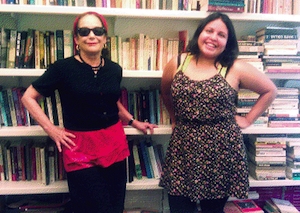 Carol Hernandez was born in Escondido, California to Josefina Alvarez and Rafael Hernandez. In 2008, Carol began her undergraduate career at UC Santa Cruz as a History major. In 2011, Carol became an advocate for the formation of a Critical Race and Ethnic Studies Program at UCSC. Carol began working with professor Lisbeth Haas in 2012 through the Undergraduate Research ApprenticeshipProgram. Since then, Lisbeth Haas has been Carol’s academic mentor, guiding her through her last years at UCSC. Carol will graduate with a BA in History from UCSC in the winter of 2013. After graduation, Carol will apply to graduate school, where she will peruse her interest in the study of trauma, memory and substance abuse.
Carol Hernandez was born in Escondido, California to Josefina Alvarez and Rafael Hernandez. In 2008, Carol began her undergraduate career at UC Santa Cruz as a History major. In 2011, Carol became an advocate for the formation of a Critical Race and Ethnic Studies Program at UCSC. Carol began working with professor Lisbeth Haas in 2012 through the Undergraduate Research ApprenticeshipProgram. Since then, Lisbeth Haas has been Carol’s academic mentor, guiding her through her last years at UCSC. Carol will graduate with a BA in History from UCSC in the winter of 2013. After graduation, Carol will apply to graduate school, where she will peruse her interest in the study of trauma, memory and substance abuse.
Lisbeth Haas is a Professor of History and Chair of Feminist Studies. She has just recently finished her third book in a trilogy of work on California history. The books include Conquests and Historical Identities in California, Pablo Tac, Indigenous Scholar Writing on Luiseño Language and Colonial History, and the forthcoming Saints and Citizens: Indigenous Histories of Colonial Missions and Mexican California. Professor Haas is a Distinguished Lecturer for the Organization of American Historians, and has taught at U.C. S.C. since the late l980s. She teaches classes on California history, the Southwest and Borderlands, Women’s Labor History, History and Theory, Diaspora, and Histories of Colonialism, Nationalism, and Race. She enjoys working closely with students, and appreciates the opportunity to work with Carol as she prepares for graduate school.
Summary of Project
In the present mentorship Carol is working on the project titled M: Mother, Mountains, Migration, and Memory. The current study examines one of the poorest areas of the Blue Ridge Mountains through its modernization, industrialization, and deindustrialization. Mexican migration to the region occurred with its economic restructuring in the late twentieth century, simultaneous to the movement of the area’s factories to border industrial zones in Mexico. This study places the local histories of migration and memory, place and political economy, within a global context. Carol will do bibliographic research and help prepare grant and fellowship applications to fund further research and writing.
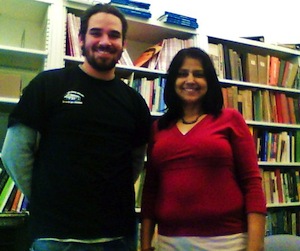 Eric Hernandez was born and raised in Los Angeles. He is currently a senior studying Anthropology with a focus in Cultural Anthropology and is Officer of Publicity for the UCSC Anthropology Society. Eric served in the US Navy as a welder for 10 years and was honorably discharged in February of 2012. He is now dedicated to working on social justice issues in the local community. As a student of anthropology, his research interests include culture critique and the feminist and queer perspectives in anthropology. After spending a month studying Indigenous Literary and Social Movements in Chiapas Mexico through UC Davis' Summer Abroad program, he has also developed an interest in grassroots activism and revitalization movements.
Eric Hernandez was born and raised in Los Angeles. He is currently a senior studying Anthropology with a focus in Cultural Anthropology and is Officer of Publicity for the UCSC Anthropology Society. Eric served in the US Navy as a welder for 10 years and was honorably discharged in February of 2012. He is now dedicated to working on social justice issues in the local community. As a student of anthropology, his research interests include culture critique and the feminist and queer perspectives in anthropology. After spending a month studying Indigenous Literary and Social Movements in Chiapas Mexico through UC Davis' Summer Abroad program, he has also developed an interest in grassroots activism and revitalization movements.
Annapurna Pandey is a trained sociologist, anthropologist, and teach Cultural Anthropology as well as the Merrill College Core Course. Her research is primarily on women's activism in the process of globalization in India, particularly in the state of Odisha. She has focused her research on women's empowerment in Odisha and the Non-Governmental Organization, which is helping women marginalized by the state and society. Her research interests include women’s issues, their political and religious lives, and their representation in film, media, and literature dealing with India and Indian Diaspora. Since 1995 she has shifted her research interests into filmmaking, focusing on the experiences of the diasporic Odias in the greater Bay Area. She has produced a documentary titled "Homeland in the Heart" and is working on another documentary titled "Giving Life to God: The Installation of Lord Jagannath in the Fremont Hindu Temple." Currently, she is serving a two-year term as the president of the Orissa Society of the Americas.
Summary of Project
Eric and Annapurna are working on a documentary on women's participation in a micro finance program In Odisha, India.
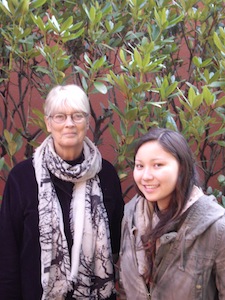 Rachel Mohr is a graduating senior currently studying psychology at UCSC. Primarily interested in the influence of social structures upon personality development, she hopes to begin a career as a social worker for the County of Los Angeles, one of the nation's most diverse and populous regions. She wants to work with at-risk youth, particularly those involved in the foster care system. Rachel's other life goal is to eat the Vietnamese noodle soup phở in each of the fifty United States.
Rachel Mohr is a graduating senior currently studying psychology at UCSC. Primarily interested in the influence of social structures upon personality development, she hopes to begin a career as a social worker for the County of Los Angeles, one of the nation's most diverse and populous regions. She wants to work with at-risk youth, particularly those involved in the foster care system. Rachel's other life goal is to eat the Vietnamese noodle soup phở in each of the fifty United States.
Dr. Carole Gerster has been a faculty member at UC-Santa Cruz since 2001. She has a Ph.D. in literature and critical studies from the University of Minnesota and has done post-graduate film studies at UC-Berkeley. Prior to coming to UCSC, she was Professor of film and literature at the University of Wisconsin-River Falls. She teaches courses on race and ethnicity in film, and teaches writing on the topics of cultural identity and global consciousness for Merrill Core. Merrill frosh have watched the film Crash and read her essay on this film every year since 2008. Her research focus is race and ethnicity in U.S. film; her book on the topic is Teaching Ethnic Diversity with Film (McFarland, 2006). She is currently working to complete a book manuscript on Paul Haggis's 2005 film Crash.
Summary of Project
Rachel Mohr will work with Dr. Gerster to research twentieth-first century race and ethnicity issues as they are reflected in the 2005 film Crash. They have three separate projects:
1) to identify the musical elements in Crash ( theme song, incidental music, and lyrics) in order to analyze how they work with (or against) the visuals in order to guide viewer responses (emotionally and intellectually) to scenes depicting specific issues. The final research goal here is to understand how aspects of the music in Crash (new or reused from earlier films) are atypical and fit with the film's general approach of inviting viewers to confront their own expectations via encounters with the unexpected.
2) to compare general themes, approaches, and even specific scenes in Crash with those in select earlier influential films on race and ethnicity (with a focus on Academy Award Best Picture winners and multicultural-cast ensemble films). The research goal here is to compare the means by which these films represent the most compelling race and ethnicity issues of their times and to determine the significance of Crash in the film history of these racial representations.
3) to research affirmative action policies for the city of Los Angeles specific to the time the characters in the film would have been affected by them, as well as current affirmative action policies and ideas about them (including the reverse racism Fisher v Texas case currently before the U.S. Supreme Court). Crash explores affirmative action from the perspective of a white male who identifies it as reverse racism and feels disenfranchised, and identifies affirmative action as one of the contentious issues that define race relations today. The ultimate research goal here is to determine the continuing sociopolitical relevance of Crash in not only reflecting but also defining the important race and ethnicity issues of our time.
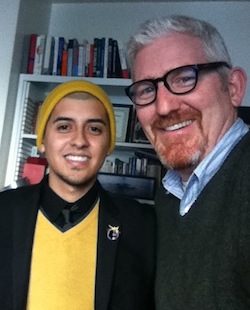 Fernando Nunez is a fourth year transfer student from Antelope Valley College in Lancaster, CA where he earned his Associates degree in Liberal Arts and Sciences. His major is Politics with a focus on International Relations, specifically International Organizations. His initial interest in International Organizations occurred while he was in community college and became involved in the Model United Nations program. Fernando has just returned from a quarter in Washington DC through the UCDC program. While there he interned at the Mexican American Legal Defense and Educational Fund (MALDEF), a Hispanic civil rights organization. He worked on several projects, from researching immigration reform, education rights, and employment discrimination, to going out and poll watching on Election Day. Fernando intends to graduate with Honors this year and pursue a Graduate degree in International Relations.
Fernando Nunez is a fourth year transfer student from Antelope Valley College in Lancaster, CA where he earned his Associates degree in Liberal Arts and Sciences. His major is Politics with a focus on International Relations, specifically International Organizations. His initial interest in International Organizations occurred while he was in community college and became involved in the Model United Nations program. Fernando has just returned from a quarter in Washington DC through the UCDC program. While there he interned at the Mexican American Legal Defense and Educational Fund (MALDEF), a Hispanic civil rights organization. He worked on several projects, from researching immigration reform, education rights, and employment discrimination, to going out and poll watching on Election Day. Fernando intends to graduate with Honors this year and pursue a Graduate degree in International Relations.
Kent Eaton is Professor and Chair in the Department of Politics at UCSC. He has taught at UCSC since 2006 and is also a participating faculty member in the Latin American and Latino Studies department. His research and teaching interests include comparative politics, international relations, and political economy, with a special focus on the Latin American region and on the global south. Prof. Eaton has conducted research in a number of countries in Latin America, including Argentina, Bolivia, Colombia, Ecuador, and Peru.
Summary of Project
Fernando will help conduct research on the dramatic shift to the Left in Latin America that has taken place as a result of sweeping electoral victories by Leftist parties and politicians across the region since 2000. His research will specifically examine how political forces on the Right are reacting to this so-called “Left Turn.” Whereas in the past the Right often turned to authoritarian solutions to combat the Left (i.e. providing support for military rule), increasingly it is turning to other strategies, including building political parties, sponsoring social movements and winning control of subnational governments. Focusing in his research on the particularly important case of Venezuela, Fernando will construct an up-to-date bibliography, summarize some of the extant literature (in Spanish and English), and peruse newspaper articles from a variety of Venezuelan dailies in order to identify key episodes in the Right’s response to the government of Hugo Chávez since 1998.
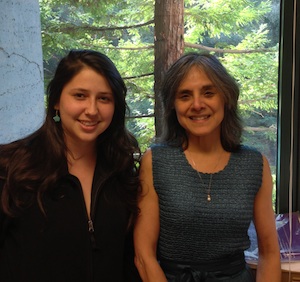 Elisabeth Parra is originally from Los Angeles California. She is a third year Human Biology major. Some of her academic interests include access to healthcare for low income and immigrant communities in California. She received her Certified Nursing Assistant license when she was 16 and has worked in various assisted living homes in Los Angeles and Santa Cruz. Currently, Elisabeth volunteers with an adult healthcare center in Santa Cruz named Elderday.
Elisabeth Parra is originally from Los Angeles California. She is a third year Human Biology major. Some of her academic interests include access to healthcare for low income and immigrant communities in California. She received her Certified Nursing Assistant license when she was 16 and has worked in various assisted living homes in Los Angeles and Santa Cruz. Currently, Elisabeth volunteers with an adult healthcare center in Santa Cruz named Elderday.
Martha Zúñiga is a Professor in the Department of Molecular, Cell, and Developmental Biology. She is a faculty mentor in the Initiative for Maximizing Student Diversity (IMSD) and Minority Access to Research Careers (MARC) programs at UCSC. She also is the departmental faculty member responsible for Health Sciences majors. She teaches Immunology and also is a professor for the Health Sciences Internship Program. Professor Zúñiga’s research is in the field of Immunology, specifically mechanisms of immunological tolerance to tissue grafts.
Summary of Project
Elisabeth is assisting Professor Zúñiga in several aspects of a project focused on immune responses to skin grafts. Specifically, the project is addressing the role of specific molecules in skin epithelial cells in determining whether a skin graft recipient’s immune system accepts or rejects the skin graft.
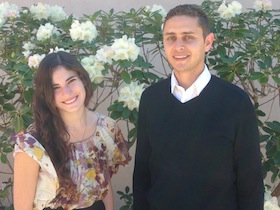 Alicia Roll is a fourth-year student from Merrill College and former participant in the Merrill Frosh Scholars program. She studies legal studies and philosophy, with a concentration in religious thought. She has been a law clerk in the Public Defender's office in Ventura County and an assistant at a law office in Santa Cruz. Alicia studied abroad at Victoria University in Wellington, New Zealand. She is excited to participate in Professor Massoud's investigation of the rule of law in conflict settings. In the future she hopes to expand into work providing legal assistance for those most ignored, perhaps in the field of animal welfare.
Alicia Roll is a fourth-year student from Merrill College and former participant in the Merrill Frosh Scholars program. She studies legal studies and philosophy, with a concentration in religious thought. She has been a law clerk in the Public Defender's office in Ventura County and an assistant at a law office in Santa Cruz. Alicia studied abroad at Victoria University in Wellington, New Zealand. She is excited to participate in Professor Massoud's investigation of the rule of law in conflict settings. In the future she hopes to expand into work providing legal assistance for those most ignored, perhaps in the field of animal welfare.
Mark Fathi Massoud is Assistant Professor of politics and legal studies at UCSC. His research draws from law, political science, and legal anthropology to focus on the institutionalization of law and human rights in conflict settings and authoritarian states. He teaches courses in international law, human rights, and the politics of law. His first book, Law's Fragile State (Cambridge Univ. Press, 2013), examines the development of the rule of law in Sudan, based on field research there.
Summary of Project
Alicia will assist Professor Massoud in a variety of research tasks including developing an annotated bibliography of literature on the rule of law in conflict settings and authoritarian states.
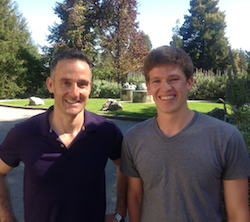 Rich Walker is a third year from San Francisco, double majoring in Politics and Economics. His primary interests include international affairs and foreign policy implementation with particular focus in Middle Eastern affairs. Rich was a participant in the 2012 EAP program in Istanbul, Turkey at Bogazici University. There he took classes in Turkish foreign policy, the political composition of the Middle East, and on the composition of international organizations. Following graduation he anticipates finding work in the international relations field with ambitions of someday working in Washington and pursuing work relating to U.S. foreign policy.
Rich Walker is a third year from San Francisco, double majoring in Politics and Economics. His primary interests include international affairs and foreign policy implementation with particular focus in Middle Eastern affairs. Rich was a participant in the 2012 EAP program in Istanbul, Turkey at Bogazici University. There he took classes in Turkish foreign policy, the political composition of the Middle East, and on the composition of international organizations. Following graduation he anticipates finding work in the international relations field with ambitions of someday working in Washington and pursuing work relating to U.S. foreign policy.
Roger Schoenman earned his Ph.D. from Columbia University in 2005 and holds an M.Sc. in Philosophy from the London School of Economics. He was a fellow at the Harriman Institute at Columbia University during the 2006-2007 academic year and a fellow of the American Council of Learned Societies in 2006. Since 2005, he has been assistant professor of politics at the University of California, Santa Cruz. Prof. Schoenman's work explores the varieties of capitalism the post-socialist countries. Recent publications investigate the impact of party-competition on the politicization of the economy and institutional development. He has recently completed a manuscript, tentatively titled Networks, Uncertainty and Institution-Building in Europe's Emerging Markets (forthcoming, Cambridge University Press), that examines the impact of party systems and cleavages, business-elite origins, and the structure of business networks on institutional development in the evolving market democracies of the post-socialist area.
